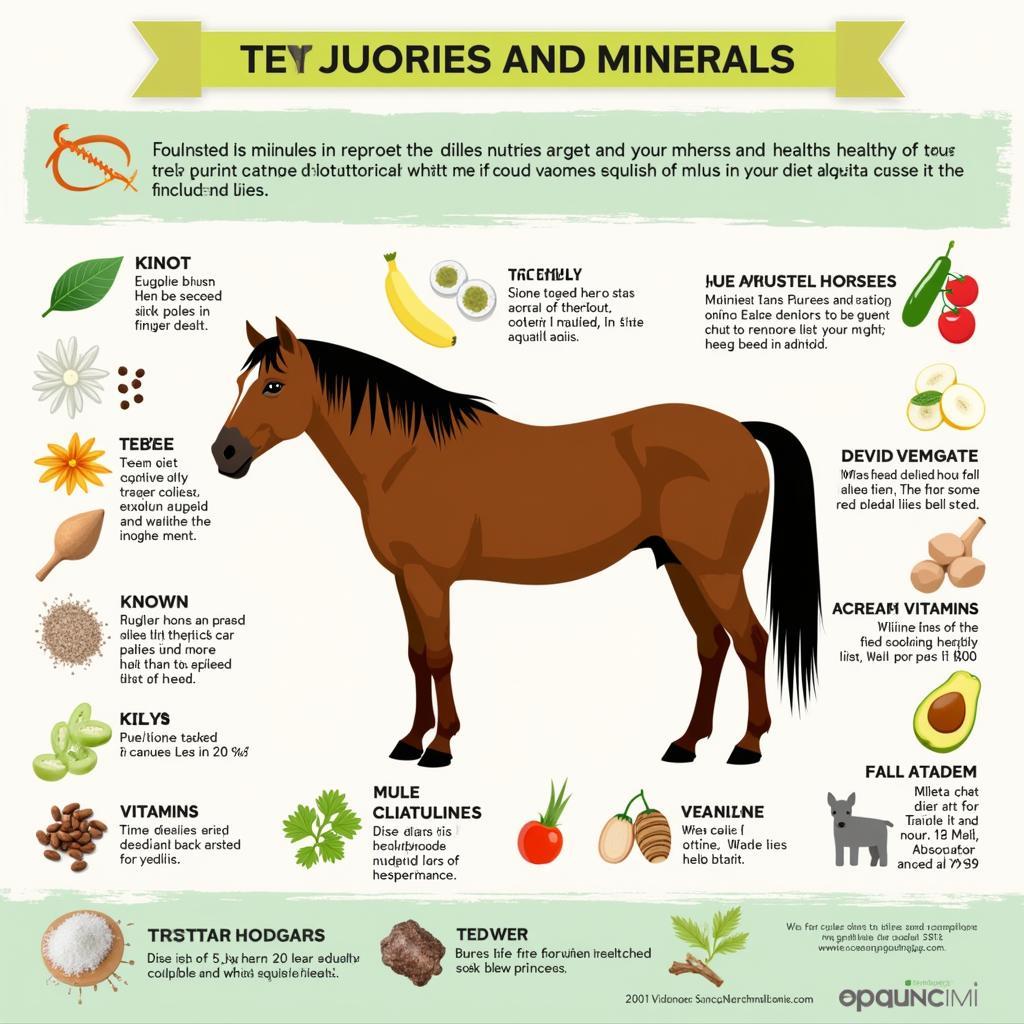Understanding Horse And Mule Feed is crucial for maintaining their health and well-being. Proper nutrition ensures optimal performance, supports a strong immune system, and contributes to a long and happy life for your equine companions. This guide will delve into the intricacies of horse and mule feed, providing valuable insights for both seasoned horse owners and those new to equine care.
Choosing the Right Horse and Mule Feed
Selecting the appropriate feed for your horses and mules depends on various factors, including their age, workload, and overall health. Young, growing animals have different nutritional needs compared to mature, working animals. Similarly, a horse used for strenuous activities like racing or competitive riding requires a higher caloric intake than a horse used for leisurely trail riding.
- Forage: The foundation of any equine diet should be good quality forage like hay or pasture. This provides essential fiber, which aids in digestion and keeps the gut healthy.
- Grains: Grains like oats, corn, and barley can provide additional calories and energy, especially for horses and mules with high energy demands. However, grains should be fed in moderation to avoid digestive upset.
- Pellets: Pelleted feeds offer a balanced mix of nutrients in a convenient form. They can be a good option for picky eaters or for ensuring specific nutritional requirements are met.
- Supplements: Supplements can be used to address specific deficiencies or to support particular health needs, such as joint health or hoof strength.
Understanding Nutritional Requirements
Just like humans, horses and mules require a balanced diet containing essential vitamins and minerals. Key nutrients to consider include:
- Protein: Essential for muscle development and repair.
- Calcium and Phosphorus: Crucial for bone health.
- Vitamins A, D, and E: Play vital roles in various bodily functions.
 Essential Vitamins and Minerals for Equine Health
Essential Vitamins and Minerals for Equine Health
Feeding Schedules and Portion Control
Establishing a regular feeding schedule is important for maintaining digestive health. Horses and mules are grazing animals and thrive on small, frequent meals. Avoid large, infrequent feedings, as this can increase the risk of colic and other digestive problems. Portion control is also crucial. Overfeeding can lead to obesity and other health issues, while underfeeding can result in malnutrition. Consult a veterinarian or equine nutritionist to determine the appropriate feeding schedule and portion sizes for your individual animal’s needs.
Common Horse and Mule Feeding Problems
Several common feeding problems can arise in horses and mules. These include:
- Colic: A potentially life-threatening condition caused by digestive upset.
- Laminitis: Inflammation of the laminae in the hoof, often associated with grain overload.
- Obesity: Can lead to a range of health issues, including joint problems and insulin resistance.
Preventing Feeding Problems
By understanding your animal’s specific needs and providing a balanced diet, you can help prevent many common feeding problems. Regular veterinary checkups and dental care are also crucial for maintaining optimal digestive health.
Conclusion
Choosing the right horse and mule feed is paramount for their overall health and performance. By understanding their nutritional needs and following a consistent feeding schedule, you can help ensure your equine companions thrive. Remember, consulting with a veterinarian or equine nutritionist can provide personalized guidance tailored to your animal’s specific requirements. A well-nourished horse or mule is a happy and healthy one!
Are you looking for high-quality horse and mule feed? Check out our selection of dixie horse and mule and charlie horse mules products.
FAQ
- What is the best type of hay for horses and mules? The best type of hay depends on the individual animal’s needs. Grass hay, such as Timothy or Orchard grass, is generally a good choice.
- How much grain should I feed my horse or mule? The amount of grain depends on the animal’s age, workload, and overall health. Consult a veterinarian or equine nutritionist.
- What are the signs of colic in a horse or mule? Signs of colic can include pawing, rolling, flank watching, and loss of appetite.
- How can I prevent laminitis in my horse or mule? Avoid overfeeding grain and ensure a balanced diet with adequate forage.
- What are the signs of obesity in a horse or mule? Signs of obesity include fat deposits around the neck, tailhead, and shoulders.
- How often should I have my horse or mule’s teeth checked? Horses and mules should have their teeth checked at least once a year by a veterinarian.
- What are some good sources of information about horse and mule nutrition? Consult with your veterinarian or equine nutritionist.
Need help with your horse and mule feed? Contact us! Phone: 0772127271, Email: [email protected] or visit us at QGM2+WX2, Vị Trung, Vị Thuỷ, Hậu Giang, Việt Nam. We have a 24/7 customer service team.